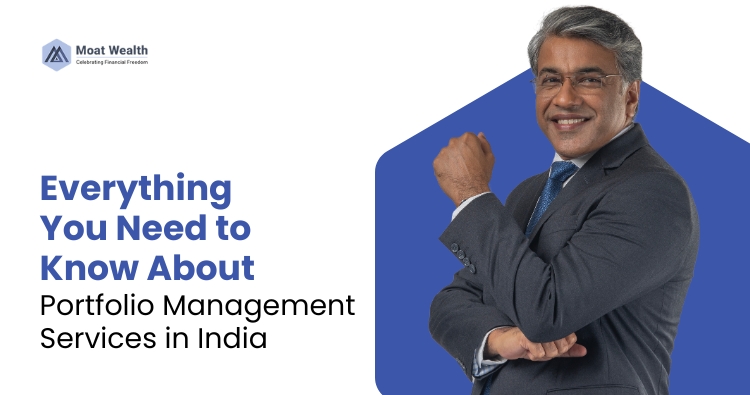Over the last five years, the Portfolio Management Services (PMS) in India has witnessed remarkable growth. The Assets Under Management (AUM) for PMS has more than doubled, reaching ₹32.22 lakh crore back in January 2024, up from ₹15.40 lakh crore in January 2019.
This surge reflects the growing trust in PMS as a vital means for wealth creation and management.
But, what exactly is PMS? This guide will help you explore everything you need to know about PMS in India.
What is a Portfolio Management Service (PMS)?
Portfolio Management Service (PMS) is a professional service offered by financial institutions and investment managers to manage an individual’s or institution’s investment portfolio.
Unlike mutual funds, where investments are pooled with other investors, PMS provides tailored portfolio management based on an individual’s financial goals, risk tolerance, and investment preferences.
In PMS, an exclusive portfolio manager makes investment decisions on behalf of their client by choosing a mix of assets like shares, bonds and other securities in order to generate desired returns.

The PMS is fee-based which may be more expensive than traditional mutual funds due to higher customization levels and active management involved.
Types of Portfolio Management Services
Portfolio Management Services (PMS) cater to a diverse range of investment needs. Here’s a brief overview of the different types available and who they are best suited for:
| Type of PMS | Definition | Ideal for |
| Discretionary PMS | The portfolio manager has full authority to make investment decisions without prior client consultation. | Investors who prefer to delegate investment management to achieve maximum returns without direct involvement. |
| Non-Discretionary PMS | The portfolio manager offers recommendations, but the client makes the final decisions on all investments. | Investors who want to retain control over investment decisions but seek professional advice. |
| Advisory PMS | The portfolio manager provides investment recommendations, leaving execution and other tasks to the client. | Investors with the expertise to manage their investments but require professional guidance. |
| PMS for NRIs | NRIs can invest through designated bank accounts or directly with a PMS provider. | NRIs looking to invest in the Indian market while complying with regulatory requirements. |
Benefits of Investing in PMS
Investing in Portfolio Management Services offers several benefits to investors:
1. Professional Management
Professional management in PMS means that your investments are handled by experienced portfolio managers who use their expertise to make informed decisions. These professionals leverage their market expertise, analytical skills, and strategic insights to make informed investment decisions that align with your financial goals.
2. Customised Investment Strategies
PMS offers investment strategies that align with your specific financial goals, risk tolerance, and preferences.
For example, if you prioritise capital preservation with moderate growth, the portfolio manager might focus on a mix of blue-chip stocks and government bonds. Conversely, if you’re aggressive and seek high returns, the strategy might include small-cap stocks and emerging market investments.
3. Diversification
A key advantage of PMS over mutual funds is the broader scope for diversification it offers.
Based on an individual, the PMS manager chooses from a wider range of products, such as real estate trusts, commodities, gold ETFs, foreign assets, and structured products. These options not only boost potential returns but also reduce risk, as many have a low correlation with equities.
4. Potential for Competitive Returns
PMS offers the potential for competitive returns through active management and concentrated investments in high-conviction stocks. This focused approach, combined with expert analysis and timely decisions, can lead to significant gains, especially in favourable market conditions.
Key Considerations When Choosing a PMS Provider
When choosing a PMS provider, it’s important to consider the following key factors:
- Investment Philosophy and Approach: Understand the PMS provider’s investment philosophy and approach. This includes their strategy for selecting investments, risk management practices, and how they align with your financial goals and risk tolerance.
- Expertise and Track Record: Evaluate the expertise and track record of the portfolio managers. Look for a provider with a proven history of delivering consistent returns and managing portfolios effectively through various market conditions.
- Transparency and Reporting: Transparency is crucial in PMS. Ensure the provider offers clear and regular reporting on your portfolio’s performance, including detailed insights into the investments and any changes made.
- Fees and Charges: Consider the fees and charges associated with the PMS. Understand the fee structure, including management fees, performance fees, and any other costs. Compare these with the potential returns to assess the value for money.
- Regulatory Compliance: Ensure the PMS provider complies with all regulatory requirements and has the necessary licences and registrations. This makes your investment safer and more trustworthy.
Are There Any Risks Associated with PMS Investing?
Yes, Investing in PMS in India can be risky. Therefore, it’s essential to understand the associated risks to make informed decisions. Here are some risks associated with PMS investing:
1. Market Risk
Market risk is the chance that the value of your investments will drop because of changes in the overall market. For example, if the stock market falls, the value of investments in your PMS may also decrease. Even with careful management, market risk can’t be avoided entirely. Thus, ensure to diversify the portfolio.
2. Concentration Risk
Concentration risk happens when a large part of your PMS investments is focused on a few stocks or sectors. If those specific investments perform poorly, your portfolio could suffer more than if it was spread across a wider range of assets. This lack of diversification means higher potential losses if something goes wrong with the concentrated investments. Thus, pay attention to this factor.
3. Manager Risk
Manager risk is the possibility that the portfolio manager might make poor investment choices, affecting your returns. If the manager’s decisions are based on incorrect information or faulty strategies, it could lead to losses in your PMS. It’s crucial to choose a manager with a strong track record and solid experience.
4. Tax Implications
PMS investments are subject to capital gains tax based on the type of assets. For instance, on equity, short-term capital gains (STCG) are taxed at 20%, and long-term capital gains (LTCG) are taxed at 12.5% for gains exceeding ₹1.25 lakh.
Additionally, dividend income from PMS investments is taxable at the investor’s applicable income tax slab rate. These taxes can reduce your overall returns. It’s important to understand how these taxes apply to your portfolio and plan accordingly.
Conclusion
Portfolio Management Services (PMS) offer a customised and professional approach to investing, making them a valuable option for those with significant assets. By researching and selecting the right PMS provider, you can make informed decisions that align with your investment objectives and ensure your portfolio is well-managed.






